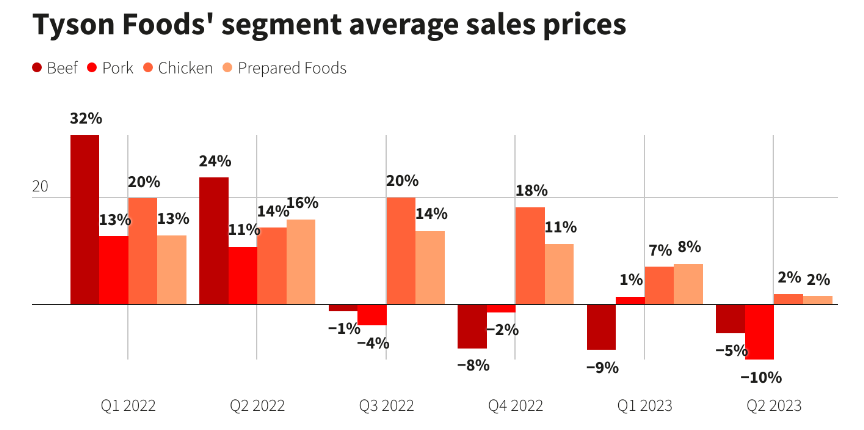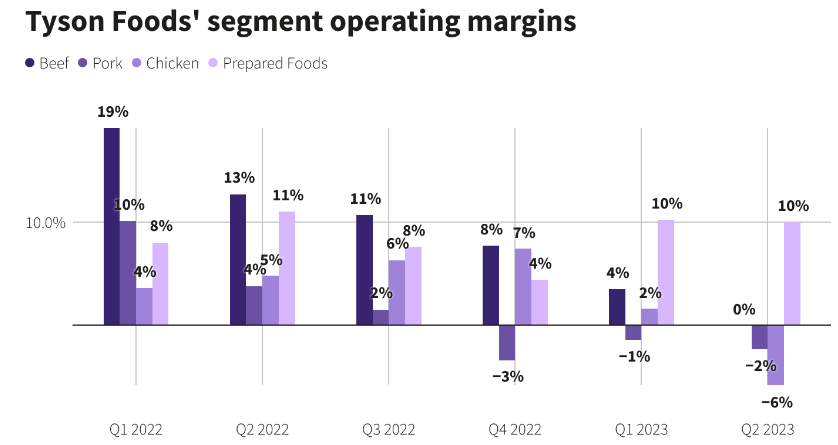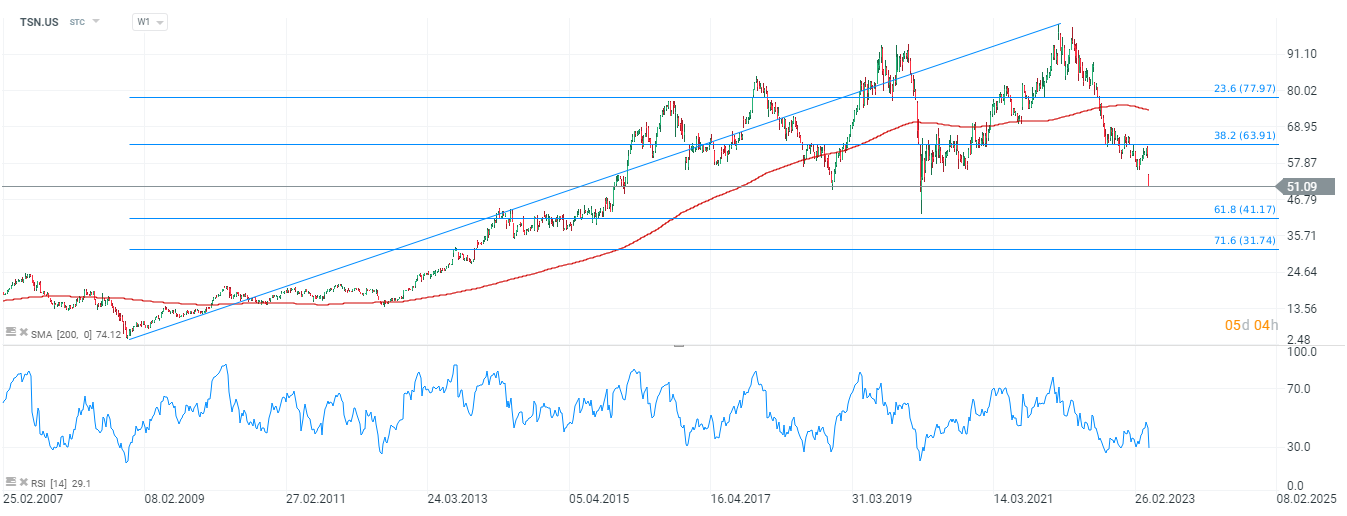Shares of major U.S. meat producer Tyson Foods (TSN.US) are losing 15% following the release of a surprise Q1 loss and lower full-year revenue forecasts. The company cited falling beef and pork prices. The reason? Falling consumption and higher costs, of course. As a result, the stock hit 3-year lows.
The company reported a $0.28 loss per share (EPS) or $97 million in net income, compared to $829 million in net income in Q1 2022. Analysts had expected $0.80 earnings per share (!). Revenue rose slightly y/y to $13.1 billion vs $13.6 billion estimated by Wall Street.
- Beef margins were 0.2%, the worst for the company since 2015
- Pork margins were negative (-2.2%) and the weakest in more than 20 years
- Poultry margins were also negative (-3.7%), with feed costs up $145 million

Tyson Foods' average selling prices. Source: Reuters

Average operating margins by Tyson Foods business segment. The producer estimated full-year beef margins at negative 1% to positive 1%, having previously estimated 2% to 4%. Source: Reuters
- The weaker results 'add to the disinflationary landscape in the U.S. and show that constrained consumer spending is slowly shifting to basic products. The disappointing net loss, in an environment of a still relatively strong U.S. consumer, could mean that if demand weakens further - the company's problems could worsen.
- The results disappointed JP Morgan analysts, among others, who were particularly surprised by the dismal performance in the poultry segment. Also, average selling prices for beef and pork fell 5.4% and 10.3%, respectively, in Q1, which ultimately affected profits.
- The price increases could not continue indefinitely. Beef sales at Tyson Foods fell 3% in Q1, which projected an 8.3% drop in overall sales.
- The company's CFO conveyed that consumer weakness is likely to continue for the rest of the year. The company will lay off about 10% of its workforce. At the same time, management remains confident that business remains healthy As a result of the weak quarter, the company lowered its sales forecast for fiscal 2023 to $53-54 billion from $55-57 billion previously.
- Higher feed costs and a drought in the United States have prompted cattle producers to send animals to slaughterhouses instead of keeping them for breeding. As a result, Tyson Foods' cattle purchase costs rose by $305 million. The company reported extremely low operating margins of 0.2% for its beef business - a near-total decline from 12.7% in Q1 2022.
 Tyson Foods (TSN.US) shares. Demand for the company's shares is weakening at a time when markets expect a 'recessionary' landscape for the U.S. economy, which would mean even weaker consumers and a possible further decline in the company's stock price. Source: xStation5
Tyson Foods (TSN.US) shares. Demand for the company's shares is weakening at a time when markets expect a 'recessionary' landscape for the U.S. economy, which would mean even weaker consumers and a possible further decline in the company's stock price. Source: xStation5

Daily summary: Silver plunges 9% 🚨Indices, crypto and precious metals under pressure

Does the current sell-off signal the end of quantum companies?

Howmet Aerospace surges 10% after earnings reaching $100 bilion market cap 📈

US Open: Cisco Systems slides 10% after earnings 📉 Mixed sentiments on Wall Street
The content of this report has been created by XTB S.A., with its registered office in Warsaw, at Prosta 67, 00-838 Warsaw, Poland, (KRS number 0000217580) and supervised by Polish Supervision Authority ( No. DDM-M-4021-57-1/2005). This material is a marketing communication within the meaning of Art. 24 (3) of Directive 2014/65/EU of the European Parliament and of the Council of 15 May 2014 on markets in financial instruments and amending Directive 2002/92/EC and Directive 2011/61/EU (MiFID II). Marketing communication is not an investment recommendation or information recommending or suggesting an investment strategy within the meaning of Regulation (EU) No 596/2014 of the European Parliament and of the Council of 16 April 2014 on market abuse (market abuse regulation) and repealing Directive 2003/6/EC of the European Parliament and of the Council and Commission Directives 2003/124/EC, 2003/125/EC and 2004/72/EC and Commission Delegated Regulation (EU) 2016/958 of 9 March 2016 supplementing Regulation (EU) No 596/2014 of the European Parliament and of the Council with regard to regulatory technical standards for the technical arrangements for objective presentation of investment recommendations or other information recommending or suggesting an investment strategy and for disclosure of particular interests or indications of conflicts of interest or any other advice, including in the area of investment advisory, within the meaning of the Trading in Financial Instruments Act of 29 July 2005 (i.e. Journal of Laws 2019, item 875, as amended). The marketing communication is prepared with the highest diligence, objectivity, presents the facts known to the author on the date of preparation and is devoid of any evaluation elements. The marketing communication is prepared without considering the client’s needs, his individual financial situation and does not present any investment strategy in any way. The marketing communication does not constitute an offer of sale, offering, subscription, invitation to purchase, advertisement or promotion of any financial instruments. XTB S.A. is not liable for any client’s actions or omissions, in particular for the acquisition or disposal of financial instruments, undertaken on the basis of the information contained in this marketing communication. In the event that the marketing communication contains any information about any results regarding the financial instruments indicated therein, these do not constitute any guarantee or forecast regarding the future results.


